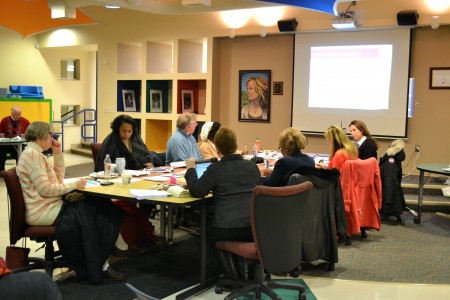AAPS Superintendent Jeanice Swift will present a sample bond proposal to trustees at Wednesday’s Ann Arbor Board of Education meeting.
Trustees will consider asking voters in May to approve a bond proposal that would address infrastructure needs, replace aging buses, and support enhancements in every classroom in every building in the district.
“As treasurer of the board, I would recommend we look at maintaining the 2.45 mills over a 10-year period,” said Donna Lasinski at a study session last week in which AAPS administrators detailed the need for an extension of revenues.
If approved, the funds would generate about $33 million.
Board President Deb Mexicotte said trustees have been unable to support infrastructure improvements over the past decade in the face of the recession, declining property values, and state revenues decrease.
“This is that unique opportunity that comes with a rising economy,” she said, noting that now is the time to do this unique funding at no tax rate rise to the public. “We have to take that opportunity.”
“If you want quality education, we know our community is committed to paying for it and supporting it,” said Trustee Susan Baskett. “I think it’s a shame not to ask. We have this opportunity. As other trustees have mentioned, we don’t get those opportunities often to be able to support ourselves.”
While budget cuts forced the district to focus on preserving basic classroom needs, AAPS Superintendent Jeanice Swift said AAPS must now consider longterm obligations.
She said as the board considers the possibility of 10-year extension of the millage, she realizes this infrastructure work is not glamorous. “But the board has proven it is willing to do the hard work,” she said.
If voters agree to extend the debt millage at its current rate in May—rather than let it decline over the next decade as it is now slated to do—homeowners would pay an additional $3 to $6 each year for every $100,000 in taxable home value.
The $33 million would be used as follows:
- Purchase new buses
- Secure entrances upgrades
- Upgrade playgounds, improve safety and reducing maintenance costs
- Refurbish softball and baseball fields
- Upgrade performing arts venues
- Purchase classroom furniture and window treatments, including shades to boost insulation
Swift explained that the district’s 36 buildings range in age from 90-plus (Bach and Community) to seven years of age, with the average about 50.
Timothy Gruszczynski, executive director of physical properties, noted that the district owns some 10,000 windows, and that window treatments are by far the most requested work order in the district. New shades to replace some that are up to 40 years old will provide additional insulation while helping to block light during digital projector presentations.
Trustee Andy Thomas noted that while the public may believe the district spending money frivolously on furnishings, he frequently sees emails from district employees saying they have an extra file cabinet or table—and that within minutes it is claimed by someone else in the district.
He said old furniture and taped-up shades is not a desired environment, and that once the community understands the degree to which staff make use of resources, there would be support for this proposal.
AAPS Assistant Superintendent for Finance and Operations Marios Demetriou noted that the average age of the 129 AAPS busses is 9.1, with 41 percent of the fleet more than 10 years old.
The administration recommends retiring 13 buses, which would keep 96 buses on the road, with 20 to spare. It also wants to replace 116 buses—including 96 general education buses and 20 special education buses—over the next five years.
The goal is to upgrade the AAPS transportation system with newer buses and some of the latest technology, which could include GPS, Electronic Vehicle Inspection Report; HD cameras; mobile communication devices, routing software, ridership tracking, and bus rider reporting to parents.
Playground upgrades are recommended at all elementary and pre-school buildings.
Lasinski said improving playgrounds would meet the needs of all taxpayers, considering the importance of such facilities to a neighborhood.
Robin Bailey, the district’s curriculum coordinator of fine arts, explained how rare it is that AAPS students are provided instruments free of charge, which for her is an “equity issue.”
She said the current K-8 instrument inventory is aging and in disrepair.
District attorney Amanda Van Dusen explained that a bond ballot proposal is different from a millage proposal because voters authorize the district to borrow an amount, and list purposes for which it can be spent.
The Ann Arbor Board of Education will meet at 7 p.m. on Wednesday, Jan. 28 at the Ann Arbor District Library.


Be the first to comment